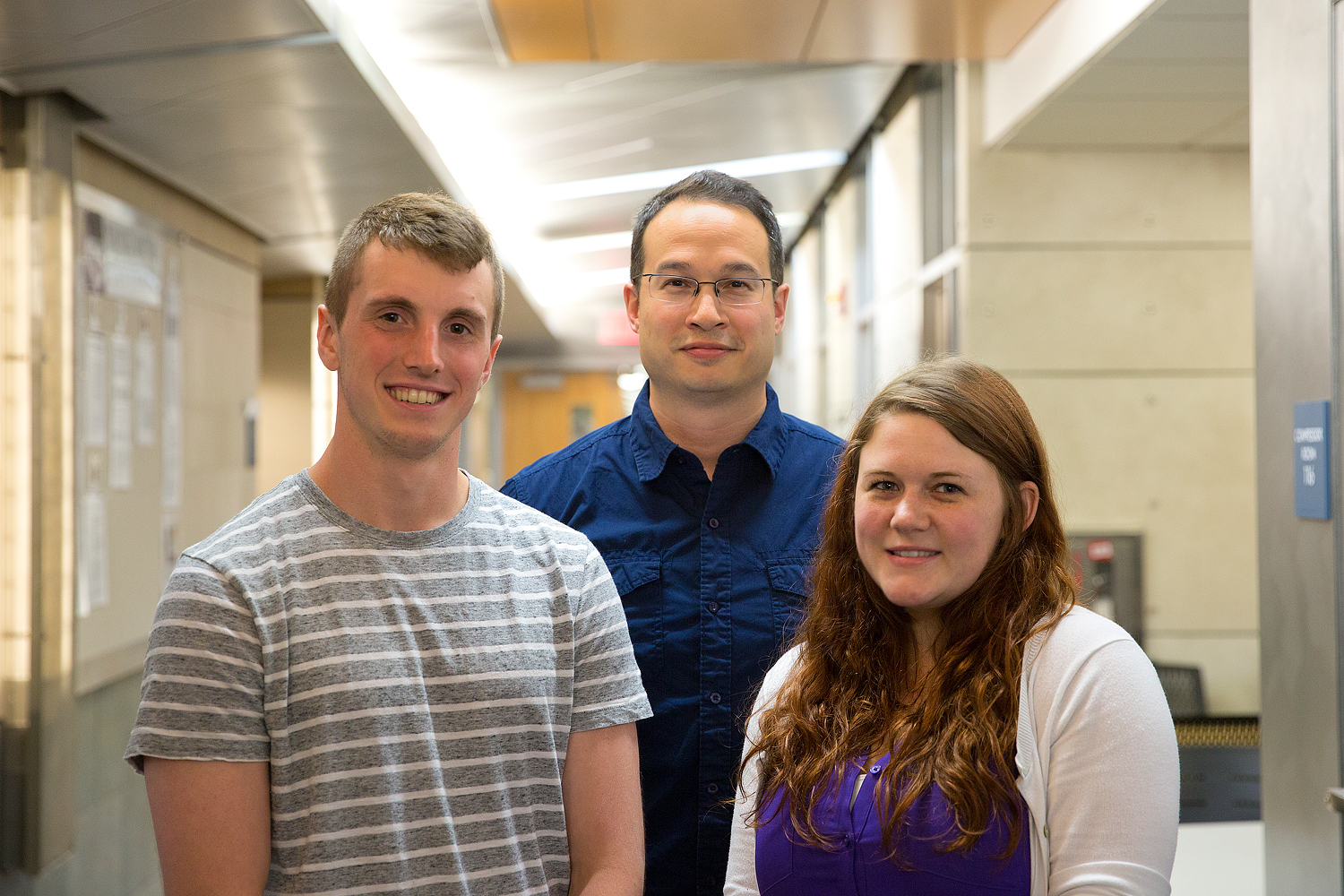During the final 15 months of his undergraduate career, Brock Chimileski ’17 (CLAS) operated at a level that very few students get to experience: He worked intensively and independently as a crucial member of a faculty research team, thanks to support from UConn’s Beckman Scholars Program.
“It allowed me to more fully devote the last year of my undergraduate career to research and work every day, which was fundamental for making headway on my project and being part of the lab,” he says. “It’s been a really productive and unique time.”
Chimileski received his scholarship in the spring of 2016, after UConn was one of only 12 institutions nationwide selected by the Arnold and Mabel Beckman Foundation to participate in its highly-competitive scholarship program.
Beckman Scholars Programs are awarded to colleges and universities that demonstrate a capability to earn national scientific research funding and whose faculty and facilities support top-level undergraduate researchers. The scholarships provide in-depth research experiences to outstanding undergraduates who major in the biological sciences or chemistry.
UConn’s Beckman program is supported by faculty mentors in the College of Liberal Arts and Sciences and School of Pharmacy, led by the Department of Physiology and Neurobiology (PNB). Six students will be awarded scholarships during UConn’s three-year award period.
“The Program’s goal is to support the next generation of research leaders by providing resources to promising undergraduate students,” says program coordinator Xinnian Chen, associate professor in residence and associate department head for undergraduate programs in the Department of Physiology and Neurobiology. “These scholars are given amazing opportunities and a remarkable level of responsibility.”
An In-Depth Experience
Chimileski, a PNB and molecular and cell biology major, began working in the lab of Assistant Professor of Physiology and Neurobiology Alexander Jackson during his sophomore year. There, he participated in both the University Scholars Program and Summer Undergraduate Research Fund Program before Jackson encouraged him to apply to become a Beckman Scholar.

“I don’t think there’s anything that compares to the Beckman Scholars Program in terms of scale and commitment on the part of an agency to an individual undergraduate researcher,” says Jackson.
Beckman Scholars are guided by an approved faculty mentor, who develops an advising plan for each student. The scholars also receive full-time funding for two consecutive summers and part-time funding during the intervening academic year to work on their research projects.
“Working full-time during the summers allows you to really have a laser focus in the lab and to be able to come in every day, all day, work like a graduate student, and immerse yourself in your research,” says Jackson.
Working alongside Ph.D. candidate Laura Mickelsen, Chimileski focused on optimizing techniques used to examine unique populations of neurons in the lateral hypothalamus, an area of the brain that regulates functions like hunger, metabolism, arousal, and motivation. Chimileski says that optimizing these techniques will help researchers visualize gene expression within individual cells and in entire sections of the brain.
His results could lead to identifying specific markers for neurons and circuits that contribute to sleep disorders, like narcolepsy, and other pervasive health conditions, like obesity, diabetes, and addiction.
“By trying to better characterize some of the misunderstood cell types in this region, we can better understand how their broad functions are regulated and, down the line, how we can use this knowledge to treat disease,” says Chimileski.
Jackson says that, during his scholarship award period, Chimileski became a tremendous asset to his lab as a researcher, team member, and mentor to other undergraduate students. Chimileski has co-authored one publication, forthcoming in the journal eNeuro; he will be a co-author on two other manuscripts in preparation; and his work was presented at local, national, and international conferences, including the Society for Neuroscience 2016 annual meeting in San Diego.
“Brock has shown so much growth scientifically during his time as a Beckman Scholar. He’s an exceptional student, has been a pleasure to work with, and has a bright future ahead of him,” Jackson adds.
Preparing Future Leaders
As the capstone of his scholarship experience, Chimileski traveled to Irvine, Calif., in August to present the results of his independent project at the 2017 Beckman Symposium.

“I could not be more grateful for the generous support of the Beckman Foundation. This conference was a very unique and worthwhile experience.”“Not only were there other undergraduate Beckman Scholars from universities all across the nation, but also postdoctoral fellows and young professors who received support from the Foundation,” he says.
Elizabeth Rodier ’18 (CLAS) and Jessica Young ’19 (CLAS), who were selected this spring as the next Beckman Scholars from UConn, joined Chimileski at the symposium. The final three scholarship recipients will be awarded in early 2018.
While Rodier and Young continue their research this fall, Chimileski will move to Boston and work as a clinical researcher at Boston Children’s Hospital while applying to medical schools. He plans to live with his brother and fellow UConn alumnus Scott Chimileski ’08 (CLAS), ’15 Ph.D., who Brock says first sparked his interest in science during their overlapping time on campus.
The younger Chimileski says that he ultimately wants research to be a focal point of his career in medicine, whether it’s in the form of laboratory research, direct clinical work, or public health.
“No matter which route I end up going, I know that what I’ve learned at UConn with support from the Beckman Scholars Program has set a strong foundation for my career,” he says.



